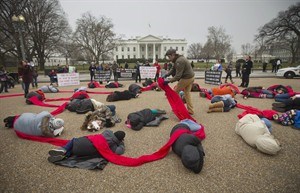
CORRECTS TO ANTI-ABORTION ACTIVISTS - Anti-abortion rights activists are connected with a red piece of cloth as they stage a 'die-in' in front of the White House in Washington, Wednesday, Jan. 21, 2015. Tomorrow marks the 42nd anniversary of the landmark 1973 Roe vs Wade decision and the March for Life, an annual gathering of abortion protest that dates back to 1974. (AP Photo/Pablo Martinez Monsivais)
January 22, 2015 - 7:40 AM
WASHINGTON - With thousands of abortion foes massing blocks away for their annual protest march, Republicans pushed legislation toward House passage Thursday tightening restrictions on federal financing of abortions. But it was not the bill an embarrassed GOP had hoped to approve.
Republican leaders had wanted to defy a White House veto threat and approve legislation criminalizing most abortions after 20 weeks of pregnancy. Late Wednesday, they abruptly postponed the confrontation indefinitely after concluding they were short of votes.
Instead, the House began debating legislation barring taxpayer funding of abortions - a prohibition that's already largely in place.
Republicans say the bill will tighten the restrictions to make sure no funds flow to abortions under President Barack Obama's health care law. It is the same as a measure the House approved last year on a near party-line vote.
"Conscientious pro-life Americans who don't want to be complicit in the wounding of women and killing of babies are paying for abortions, and many of them don't even know it," said Rep. Christopher Smith, R-N.J., a longtime abortion opponent.
Democrats mocked the GOP's failure to rally support behind the measure barring late-term abortions but said sarcastically that Republicans seemed to have unlimited numbers of bills curbing the procedure.
"Can't pass this one? Grab another. Can't pass that one? Grab the next one," said Rep. Louise Slaughter, D-N.Y. "Their insistence on attacking women's health seemingly knows no bounds."
The turnabout came hours before the start of the annual March for Life protesting the Supreme Court's 1973 Roe v. Wade decision legalizing abortion. It also came with GOP leaders eager to showcase the ability by the new Republican-led Congress to govern efficiently and avoid gridlock.
Tony Perkins, president of the conservative Family Research Council, expressed disappointment that "a handful" of lawmakers had forced a delay in the late-term abortion restrictions but added, "We applaud the leadership for remaining committed to advancing pro-life legislation."
Cecile Richards, president of Planned Parenthood Action Fund, said of the bill, "These attacks are so dangerous, extreme and unpopular that House Republicans can't even get their membership lined up behind them."
The delayed bill would have allowed exemptions to the late-term abortion ban for victims of rape or incest and in cases when a woman's life was in danger. But GOP leaders ran into problems because some GOP women and other lawmakers objected that the rape and incest exemptions only covered women who had already reported the crimes to authorities.
The rebellious Republicans argued that that requirement put unfair pressure on women who have already suffered. A 2013 Justice Department report calculated that only 35 percent of rapes and sexual assaults were reported to police.
Political pressures cut both ways. Leaders had resisted the awkwardness of postponing a high-profile abortion vote scheduled for the day of the anti-abortion march. And they didn't want to push anti-abortion legislation through the House that was opposed by GOP women, especially as the party tries appealing to more female voters ahead of the 2016 elections.
Yet when the leaders considered eliminating the requirement that rapes and incest be previously reported, they encountered objections from anti-abortion groups, Republican aides said. They chose not to anger that powerful GOP constituency.
The bill had virtually no chance of becoming law, thanks to opposition from President Barack Obama and an uncertain fate in the Senate, where anti-abortion sentiment is less pronounced. Even so, Republicans consider the bill an important statement of their priorities and a show of support for a vital issue for conservatives.
Supporters named their measure the Pain-Capable Unborn Child Protection Act. But Democrats touted arguments by doctors' groups like the American Congress of Obstetricians and Gynecologists, which have cited research indicating that fetuses are unlikely to feel pain until the third trimester, which starts around the 28th week.
A report Tuesday by the nonpartisan Congressional Budget Office, citing the federal Centers for Disease Control and Prevention, estimated that about 10,000 abortions annually are performed 20 weeks or later into pregnancies. The budget office estimated that if the bill became law, three-fourths of those abortions would instead occur before the 20th week.
News from © The Associated Press, 2015